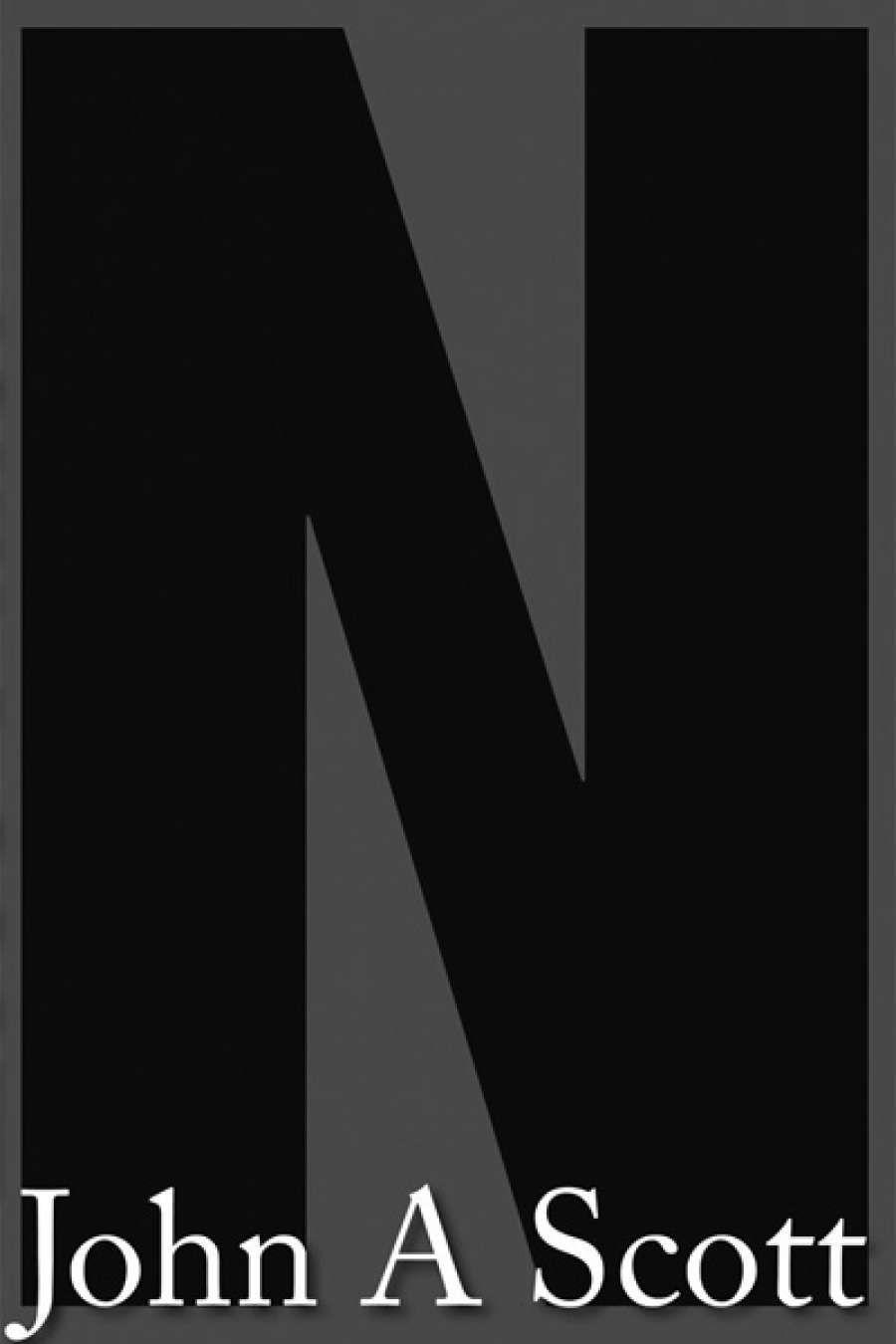
- Free Article: No
- Contents Category: Fiction
- Custom Article Title: Don Anderson on John A. Scott's new novel
- Review Article: Yes
- Online Only: No
- Custom Highlight Text:
The last words of the endnotes to John A. Scott’s most recent novel – earlier ones have won the Victorian Premier’s prize for fiction and been shortlisted for the Miles Franklin Award – and thus the last words of this book, if we exclude back-cover plaudits, read: ‘An additional narrative strand, chronicling the history of Surrealist André Breton in Melbourne, 1952, omitted from this version of N for reasons of overall length [emphasis added], appears in Southerly, Vol. 73, No 3, 2013 (“The Naked Writer”).’ As these words appear on page 599 of N, a sesquipedalian opus if ever there was one, it can only be observed, echoing Francisco in the first scene of Hamlet, ‘for this relief much thanks’, for N is already over-long, over-plotted, over-the-top, making excessive demands upon the reader’s generosity and her stamina.
- Book 1 Title: N
- Book 1 Biblio: Brandl & Schlesinger, $32.95 pb, 599 pp, 9781921556203
We are, of course, accustomed to big novels, living as we do in the shadow of Foster Wallace’s Infinite Jest and Pynchon’s Against the Day, which themselves inhabit the long shadow of Gaddis’s The Recognitions, which in turn recalls Joyce’s Ulysses and Finnegans Wake. Then one might cite Proust’s À la recherche du temps perdu and Musil’s The Man without Qualities, not forgetting Such Is Life. In a not well-disposed review of Scott’s ‘long work of historiographic metafiction’ in The Saturday Paper (April 19–25), the anonymous ‘TW’ opines that N ‘is clearly in thrall to postmodernist maximalist opuses such as Infinite Jest, The Recognitions, 2666, A Naked Singularity, and Gravity’s Rainbow. [Let us not forget Against the Day, surely.] You can tick off the elements: the irony and dark humour, the abundance of characters [requiring a one-page dramatis personae], the intertwining narrative threads, the temporal nonlinearity, the unexpected spurts of magic realism, and the employment of both real and imitation documentary materials.’ All this is more or less true, but N hardly feels ‘postmodernist’. Some mixture, rather, of V and The Count of Monte Cristo. Both structurally and in its humanist political sympathies, it is winningly old-fashioned.
N is set in Australia, perhaps especially in Melbourne, during World War II. Scott’s endnotes provide scholarly sources for his flights of dystopian fancy, particularly Drew Cottle on the Brisbane Line, Bernard Smith on Noel Counihan, and Craig Munro on P.R. ‘Inky’ Stephensen. Fictional accounts of the invasion of Australia ‘have been basically treated as non-fictional (historical) texts’, which is a novelist’s, particularly a postmodernist novelist’s, prerogative. Distinctions are blurred when an Australian boy’s great-aunt is obviously (to those in the know, at least) Gertrude Stein, and the boy hears her and Alice ‘lifting belly’ at night-time in a virtuoso piece of comic lubricity. The novel includes politics and plague, and as the book’s only illustration, five pages from its end, is of the ‘children overboard’ incident from the Howard era, the reader is surely encouraged to postulate analogies between the novel’s fictional wartime conservative government, with its echoes of Hitler’s Germany, especially its treatment of art and artists, and other, more recent times.
The text is larded with literary allusions as well as with detailed evocations of socialist realist paintings (which may be some kind of ironic leg-pull given that the novel itself is neither realist nor socialist). Its incarceration of the fascist writer Henningsen (he of the Hitlerian moustache) recalls Ezra Pound in the cage at Pisa. There is (another) picnic at Hanging Rock. Robin Telford, a central character and the first featured in the ‘Dramatis Personae’, learns from Reginald Thomas, ‘radio dramatist and seer’, whom the wartime conservative government imprisons and tortures, that ‘sometimes only what has been imagined is the truth’. Much is made of Poe’s ‘Purloined Letter’, a copy of which is, all too appropriately, purloined. Like Alice, a character makes significant discoveries through the looking glass.
 John A. Scott and ABR editor Peter Rose
John A. Scott and ABR editor Peter Rose
Like a modernist rather than a postmodernist novel (consider the openings and closings of both Ulysses and Finnegans Wake as literary versions of the ouroboros, the great serpent with its tail in its mouth), N describes in over five hundred and eighty pages a full circle. It begins with Missy Cunningham, ‘piano teacher, model, wife to social realist artist Roy, mother to Ross’, watching her son play with his lead soldiers and extrapolating notions of the actual war. It ends, with the same scene, but with a significant difference. ‘Missy watches as her son takes them [his lead soldiers], one in each hand, holding them a moment above the darkness. He lets them fall. He reaches for the lid, brings it down upon the box. And in that moment everything disappears.’ Our revels now are ended … In my end is my beginning. Echoes to end a book full of echoes.
And what of N ? What can the book’s teasing title signify? Well, it does play crucial parts in the plot, but to reveal any of these, perhaps even to speculate upon their significance, would constitute a spoiler. It might be suggested that it does not signify Nazi, or Nowra, or ‘Nevermore’. Nor does it serve its author’s several purposes in the way that ‘V’ does Pynchon in the novel of that name. No, it serves far simpler ends than that. Here an anecdote may be of some use. Anthony Burgess expressed surprise that Vladimir Nabokov (that’s ‘V’ and ‘N’ at one hit) did not sign himself ‘N’. ‘After all,’ Burgess added, ‘it was good enough for Napoleon.’ And good enough for John A. Scott?


Comments powered by CComment